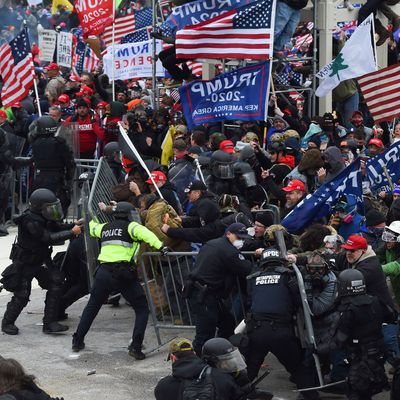
Throughout the Trump era, Republican Party officials and its professional class have gone through a constant and frequently vicious internecine struggle, pitting the small, but well-placed, bloc of anti-Trump elites against an opposing bloc of genuine Trump cultists. Throughout, the balance of power has been held by Republicans who abhor Trump personally and consider him a net liability, but temper their disdain with complacency laced with contempt.
What they hate about Trump is his untrustworthiness on policy matters like trade and foreign policy, lack of professionalism, and irrepressible tendency to embarrass them by putting the party’s agenda in the crudest terms. They do not consider Trump any serious threat to the Republic — not during his presidency, and certainly not since January 20.
Understanding those beliefs is key to following the party through the ongoing purge of Liz Cheney. The party’s middle faction initially sympathized with Cheney’s anger at Trump for his reckless and cringe-inducing effort to goad a mob into storming the Capitol on January 6. Putting Mike Pence’s life in danger is not a stunt any of them take lightly. But now the balance of their anger has tilted toward Cheney. She refuses to let this thing go, and she is putting the party’s messaging at risk.
The document that most clearly expresses the mainstream Republican view is a column by National Review’s Dan McLaughlin. To begin with, McLaughlin lays out the party Establishment’s view of the stakes: While the dispute is “dressed up as disagreements over issues and approaches,” it “is actually almost entirely about the personality and character of Donald J. Trump.” Trump is a boor and a sleaze, but there’s no larger principle at stake.
Next, McLaughlin insists that Trump’s embarrassing behavior is all behind them. “Cheney has made herself a symbol of inter-Republican resistance to Trump’s post-election temper tantrum, to his fables about a stolen election, and to his role in provoking the Capitol riot — all of which is fair to call out, but all of which is now in the past.” [Emphasis added.]
Of course, this very assumption is what Cheney contests. Her op-ed explicitly argues that Trump is laying the groundwork to undermine democracy going forward. The very first paragraph asserts, “There is good reason to believe that Trump’s language can provoke violence again. Trump is seeking to unravel critical elements of our constitutional structure that make democracy work — confidence in the result of elections and the rule of law.” Its headline says the party is “at a turning point.”
Right now, Trump is energetically spreading his lies, and succeeding in bringing the party’s base over to his side. Republicans are enacting voting restrictions nationwide premised on his lies, holding a sham “recount” in Arizona, and purging a slate of state and local officials who resisted Trump’s autogolpe.
Perhaps McLaughlin disagrees, but it’s telling that, rather than defend his disagreement, he simply assumes there is no danger going forward. Why is that?
Well, the answer can probably be deduced from this passage:
In order to continue representing the desires and interests of their voters, they would rather put the issue behind them and focus on the actual, current president and his actual, current agenda. Cheney writes in a Washington Post op-ed published Wednesday, “The question before us now is whether we will join Trump’s crusade to delegitimize and undo the legal outcome of the 2020 election, with all the consequences that might have.” But it is in no way in the interests of the Republican Party or its voters for this to be the question currently before the House or the party.
In the first sentence, McLaughlin asserts that Republicans should represent “the desires and interests of their voters.” In the last, he asserts “the
interests of the Republican Party” and “its voters” are not to question Trump’s crusade to delegitimize the election.
He is almost certainly right about the party’s interest. Contesting Biden’s election is a poor public-facing message for the GOP, which indeed has a stronger interest in changing the subject to issues that poll better. On the other hand, the communication by Trump and his cultists has not stopped and will not stop. They are laying the groundwork for another challenge to the democratic system with a more favorable response. The question is whether Cheney can answer their arguments, or whether the party’s leadership should stay silent and leave the field to Trump.
If and when Republicans mount their next effort to subvert an election, it will be in their interest to succeed, though it will not be in the country’s interest. But note that while Cheney’s argument is framed around the country’s interest, McLaughlin’s response is framed around the party’s interest. The reason he doesn’t even bother addressing Cheney’s concern about the ongoing danger of a Republican Party that refuses to accept defeat is that he does not see it as a danger to the party.
There is a long-standing belief on the right that Democratic Party victories are inherently fraudulent. They rely on massive levels of undetected fraud in Democratic-run cities teeming with lawlessness, and mobilize majorities who use their power to illegitimately redistribute wealth from its rightful owners to themselves.
The highbrow version of this belief has long been articulated in conservative organs such as National Review. Trump expressed a crude, lowbrow version, and employed crude, lowbrow tactics. Highbrow right-wing authoritarians look at their lowbrow cousins with contempt and embarrassment. The lowbrow authoritarians look at the highbrows as snobs and wimps. Ultimately, however, their shared beliefs outweigh their differences.
So when the next right-wing coup attempt takes place, backed by the overwhelming majority of Republican voters who believe Trump legitimately won in 2020, what will the mainstream Republicans do? The answer should already be clear. The next insurrection will be a Brooks Brothers riot.






























